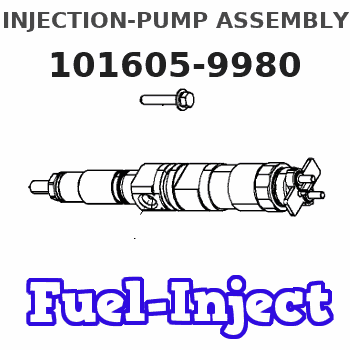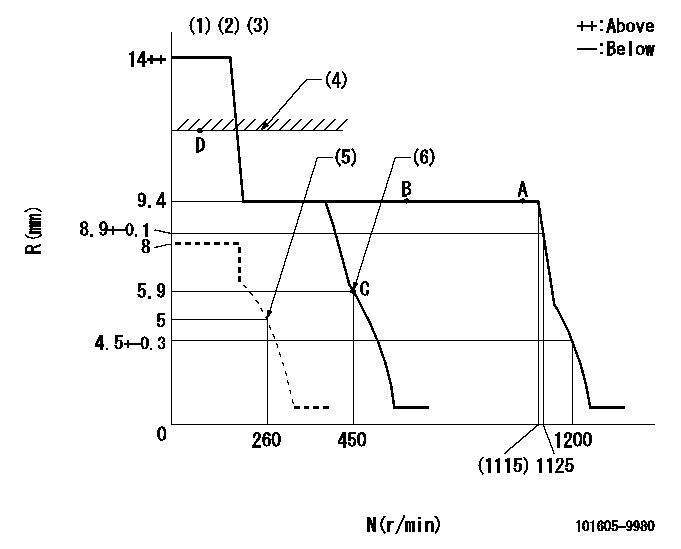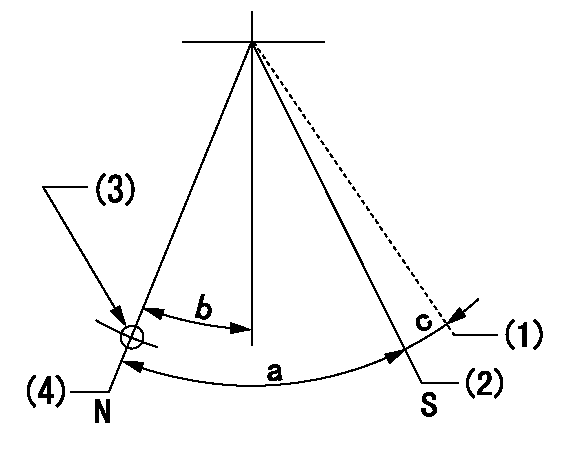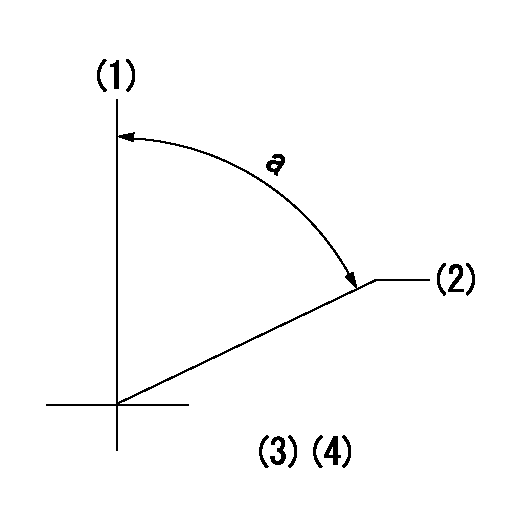Information injection-pump assembly
BOSCH
9 400 615 400
9400615400
ZEXEL
101605-9980
1016059980
MITSUBISHI-HEAV
3436104070
3436104070

Rating:
Include in #2:
104740-1991
as _
Cross reference number
BOSCH
9 400 615 400
9400615400
ZEXEL
101605-9980
1016059980
MITSUBISHI-HEAV
3436104070
3436104070
Zexel num
Bosch num
Firm num
Name
101605-9980
9 400 615 400
3436104070 MITSUBISHI-HEAV
INJECTION-PUMP ASSEMBLY
S6K-T K
S6K-T K
Calibration Data:
Adjustment conditions
Test oil
1404 Test oil ISO4113 or {SAEJ967d}
1404 Test oil ISO4113 or {SAEJ967d}
Test oil temperature
degC
40
40
45
Nozzle and nozzle holder
105780-8140
Bosch type code
EF8511/9A
Nozzle
105780-0000
Bosch type code
DN12SD12T
Nozzle holder
105780-2080
Bosch type code
EF8511/9
Opening pressure
MPa
17.2
Opening pressure
kgf/cm2
175
Injection pipe
Outer diameter - inner diameter - length (mm) mm 6-2-600
Outer diameter - inner diameter - length (mm) mm 6-2-600
Overflow valve
131424-5720
Overflow valve opening pressure
kPa
255
221
289
Overflow valve opening pressure
kgf/cm2
2.6
2.25
2.95
Tester oil delivery pressure
kPa
157
157
157
Tester oil delivery pressure
kgf/cm2
1.6
1.6
1.6
Direction of rotation (viewed from drive side)
Right R
Right R
Injection timing adjustment
Direction of rotation (viewed from drive side)
Right R
Right R
Injection order
1-5-3-6-
2-4
Pre-stroke
mm
3.6
3.55
3.65
Beginning of injection position
Drive side NO.1
Drive side NO.1
Difference between angles 1
Cal 1-5 deg. 60 59.5 60.5
Cal 1-5 deg. 60 59.5 60.5
Difference between angles 2
Cal 1-3 deg. 120 119.5 120.5
Cal 1-3 deg. 120 119.5 120.5
Difference between angles 3
Cal 1-6 deg. 180 179.5 180.5
Cal 1-6 deg. 180 179.5 180.5
Difference between angles 4
Cyl.1-2 deg. 240 239.5 240.5
Cyl.1-2 deg. 240 239.5 240.5
Difference between angles 5
Cal 1-4 deg. 300 299.5 300.5
Cal 1-4 deg. 300 299.5 300.5
Injection quantity adjustment
Adjusting point
A
Rack position
9.4
Pump speed
r/min
1100
1100
1100
Average injection quantity
mm3/st.
79
78
80
Max. variation between cylinders
%
0
-2.5
2.5
Basic
*
Fixing the lever
*
Injection quantity adjustment_02
Adjusting point
-
Rack position
6.7+-0.5
Pump speed
r/min
450
450
450
Average injection quantity
mm3/st.
12
10.7
13.3
Max. variation between cylinders
%
0
-14
14
Fixing the rack
*
Remarks
Adjust only variation between cylinders; adjust governor according to governor specifications.
Adjust only variation between cylinders; adjust governor according to governor specifications.
Injection quantity adjustment_03
Adjusting point
D
Rack position
9.6++
Pump speed
r/min
100
100
100
Average injection quantity
mm3/st.
70
70
80
Fixing the lever
*
Rack limit
*
Test data Ex:
Governor adjustment

N:Pump speed
R:Rack position (mm)
(1)Target notch: K
(2)Tolerance for racks not indicated: +-0.05mm.
(3)The torque control spring does not operate.
(4)RACK LIMIT
(5)Set idle sub-spring
(6)Main spring setting
----------
K=10
----------
----------
K=10
----------
Speed control lever angle

F:Full speed
I:Idle
(1)Stopper bolt setting
----------
----------
a=20deg+-5deg b=3deg+-5deg
----------
----------
a=20deg+-5deg b=3deg+-5deg
Stop lever angle

N:Pump normal
S:Stop the pump.
(1)Contacts outer boss.
(2)Contacts inner boss.
(3)Use the hole at R = aa
(4)Normal
----------
aa=60mm
----------
a=53deg+-5deg b=26.5deg+-5deg c=(11deg)
----------
aa=60mm
----------
a=53deg+-5deg b=26.5deg+-5deg c=(11deg)
Timing setting

(1)Pump vertical direction
(2)Position of camshaft's key groove at No 1 cylinder's beginning of injection
(3)-
(4)-
----------
----------
a=(60deg)
----------
----------
a=(60deg)
Information:
Downhill
When cresting a hill, the decision of whether to use power or not on the downside of the hill must be made. Best fuel economy results from using minimum power to get back to speed after climbing a grade. However, care must be taken not to allow the engine to overspeed. This engine should not exceed 2300 rpm. The PEEC cruise control may use full engine power to return the truck to the cruise set speed if the engine was unable to maintain the set speed while climbing a hill. The cruise control should be turned off before cresting the top of a hill and light throttle used to regain vehicle speed on a downhill to minimize fuel consumption.If equipped with an exhaust brake, the engine should not exceed maximum braking rpm. Refer to "Auxiliary Exhaust Brakes" section of this manual.Saving Fuel On Hills
Rolling hills provide a great opportunity to reduce fuel. Avoid downshifting on small hills. If a hill can be topped without downshifting, even if the engine lugs to the peak torque rpm (1100 - 1200), the truck should not be downshifted.On long grades that require one or more downshifts, let the PEEC engine lug back to the peak torque rpm. If road speed stabilizes with the engine running at or above peak torque rpm, remain in that gear. When going down hill, use gravity instead of engine power to regain vehicle speed.Long steep down grades should be anticipated. Vehicle speed should be reduced before cresting the top of a hill and proceeding down a long steep grade. The way to achieve maximum fuel efficiency, is to minimize the amount of braking that is used to maintain a safe vehicle speed.The engine's ability to hold the truck back increases with engine speed. A gear should be selected that runs the engine near the high engine rpm limit for long steep hills when braking is required.Speed reductions and future stops should be anticipated ahead of time to save fuel. Downshifts should be avoided and the amount of braking minimized to improve fuel consumption.Cruising Speed
It's a simple fact that the faster a vehicle is driven the more fuel it will consume. A few miles per hour (km/h) can make a significant difference in fuel economy.Increasing cruising speed from 55 to 65 mph (88 to 104 km/h) will increase fuel consumption of a typical class 8 truck approximately 1.0 mpg (0.4 km/L). A practice of driving faster to increase stop time makes those stops very expensive.Cruising is the most common operating condition for most trucks and therefore, provides the greatest opportunity to benefit from operation in the most fuel efficient rpm range of the engine. A significant improvement in fuel economy can be realized by operating the truck in a gear that will keep the engine between 1400 and 1600 rpm.The PEEC can be programmed to limit vehicle speed and encourage operation in the highest gear during a cruising condition for optimum fuel economy.Cruise Control (CC)
The PEEC engine can
When cresting a hill, the decision of whether to use power or not on the downside of the hill must be made. Best fuel economy results from using minimum power to get back to speed after climbing a grade. However, care must be taken not to allow the engine to overspeed. This engine should not exceed 2300 rpm. The PEEC cruise control may use full engine power to return the truck to the cruise set speed if the engine was unable to maintain the set speed while climbing a hill. The cruise control should be turned off before cresting the top of a hill and light throttle used to regain vehicle speed on a downhill to minimize fuel consumption.If equipped with an exhaust brake, the engine should not exceed maximum braking rpm. Refer to "Auxiliary Exhaust Brakes" section of this manual.Saving Fuel On Hills
Rolling hills provide a great opportunity to reduce fuel. Avoid downshifting on small hills. If a hill can be topped without downshifting, even if the engine lugs to the peak torque rpm (1100 - 1200), the truck should not be downshifted.On long grades that require one or more downshifts, let the PEEC engine lug back to the peak torque rpm. If road speed stabilizes with the engine running at or above peak torque rpm, remain in that gear. When going down hill, use gravity instead of engine power to regain vehicle speed.Long steep down grades should be anticipated. Vehicle speed should be reduced before cresting the top of a hill and proceeding down a long steep grade. The way to achieve maximum fuel efficiency, is to minimize the amount of braking that is used to maintain a safe vehicle speed.The engine's ability to hold the truck back increases with engine speed. A gear should be selected that runs the engine near the high engine rpm limit for long steep hills when braking is required.Speed reductions and future stops should be anticipated ahead of time to save fuel. Downshifts should be avoided and the amount of braking minimized to improve fuel consumption.Cruising Speed
It's a simple fact that the faster a vehicle is driven the more fuel it will consume. A few miles per hour (km/h) can make a significant difference in fuel economy.Increasing cruising speed from 55 to 65 mph (88 to 104 km/h) will increase fuel consumption of a typical class 8 truck approximately 1.0 mpg (0.4 km/L). A practice of driving faster to increase stop time makes those stops very expensive.Cruising is the most common operating condition for most trucks and therefore, provides the greatest opportunity to benefit from operation in the most fuel efficient rpm range of the engine. A significant improvement in fuel economy can be realized by operating the truck in a gear that will keep the engine between 1400 and 1600 rpm.The PEEC can be programmed to limit vehicle speed and encourage operation in the highest gear during a cruising condition for optimum fuel economy.Cruise Control (CC)
The PEEC engine can
Have questions with 101605-9980?
Group cross 101605-9980 ZEXEL
Mitsubishi-Heav
Daewoo
Mitsubishi-Heav
101605-9980
9 400 615 400
3436104070
INJECTION-PUMP ASSEMBLY
S6K-T
S6K-T